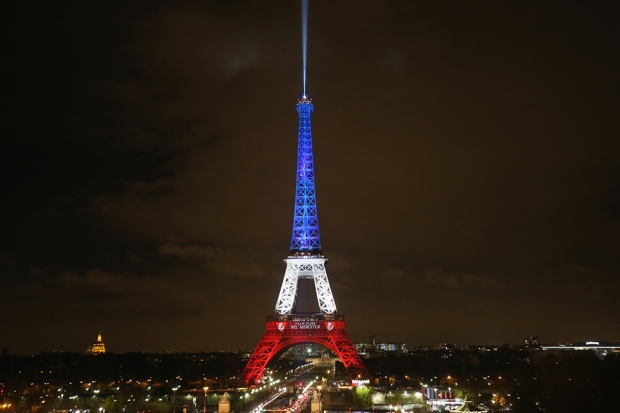Several years ago I visited the village of Couillery in Lower Normandy to interview Juliette Girard for a book I was writing about the wartime SAS. She was 80, small, grey and bird-like. She still lived on the farm on which she’d grown up, the same farm where in the summer of 1944 she hid three members of the SAS. The Germans knew the British had parachuted into the area and for nearly two weeks they scoured the countryside. They came to the farm where Juliette lived with her parents; they searched it inside out, but the soldiers had been smuggled out of the back, across a field and into a copse.
I’ve been thinking a lot about Juliette recently. That same cool, unflinching courage she displayed nearly three-quarters of a century ago has been much in evidence in Paris in the past fortnight. I’ve lived in the city for six years and there have been times when it’s driven me mad. Why can’t you get a taxi after midnight? When will shops start opening on Sunday? Do you have to let your dog crap all over the pavement? Ten euros for a pint of beer? But never have I been prouder of Paris than I have this month.
Yesterday President Francois Hollande led France in a day of homage for the 130 people who were slaughtered two weeks ago by Islamic State terrorists. Paris paused to remember, to reflect, and as soon as the ceremony at Les Invalides was over, life resumed.
That’s what the city has done so magnificently since 13 November. The world’s media have gone and the tourists aren’t coming. Hotel bookings and flight reservations have plummeted in the past fortnight. Parisians have the streets to themselves, and to be honest it’s rather enjoyable. There’s a camaraderie in the French capital, a feeling of warmth towards one another that I’ve never before experienced in Paris. It’s on the metro, in restaurants, at shopping centres, where airport-like security is now in force. It’s a camaraderie born of defiance. You feel it most in the restaurants.
Since the attack I’ve eaten out nearly every day in central Paris. As acts of courage go, it’s not exactly up there with those remarkable French security forces who fired 5,000 bullets in the shootout with the terrorist cell in St Denis last Wednesday, but it’s my own small way of showing I won’t be cowed into staying shut up at home. The restaurateurs beam the moment you walk through the door, and fellow dinners look up and nod. On occasions it’s not even a nod, just a fleeting recognition in the eyes that we’re all in this together.
We Brits have a tendency to mock the French for what we regard as their lack of fighting prowess. How does the joke go again? You know, the one about the trees on the Champs-Élysées protecting the Germans soldiers from the sun. From a nation of collaborators to a nation of cheese-eating surrender monkeys in barely half a century.
And stereotypes die hard, as demonstrated by Toby Young in an article he wrote for The Spectator in August, shortly after an Islamic terrorist was thwarted in his attempt to commit mass murder in a Thalys train travelling through France. ‘Once again, the French are relying on Americans and Brits to protect them from murderous fascists,’ thundered Young, evidently unaware that the first man to tackle the gunman was in fact a young Frenchman (who subsequently chose to remain anonymous), and not the three young Americans subsequently lauded as heroes. Another statistic, which rather undermines Toby’s theory, is that last year the French army received between 100 to 150 enquiries a day about enlisting; that figure shot up to 400 a day after the Charlie Hebdo attacks and since November 13 daily enquiries have been running at more than 1,500.
Mr Young should come and spend a few days in Paris. He should see the courage of the young women waiting at tables and that of the old ladies they serve; he should see the sang-froid of the shop assistants or the smiling chic of the theatre ushers. The French are not cowards, just as Paris is not broken.
When I visited Juliette Girard more than a decade ago, she proudly showed me a certificate that hung above the fireplace in her farmhouse. It had been presented to her by the SAS in recognition of her courage in helping three of its soldiers. ‘We are full of admiration for the disregard of danger and the generosity of spirit,’ stated the certificate. Parisians today are imbued with similar qualities.
Gavin Mortimer is the author of ‘The Men Who Made the SAS: a History of the Long Range Desert Group in WW2’.







Comments